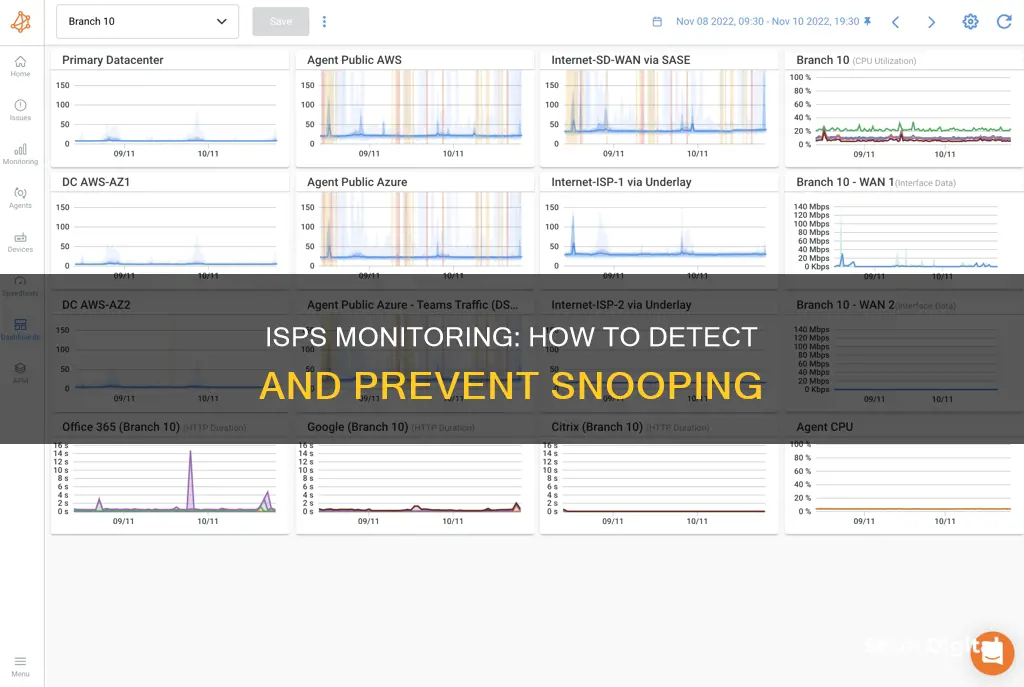
Your Internet Service Provider (ISP) can see everything you do online, including your browsing history, the videos you watch, and the websites you visit – even in incognito mode, or if you delete your history from your device. In most countries, ISPs can track and store this information for up to two years. The data is used for law enforcement, targeted advertising, and even bandwidth throttling.
ISPs track your clicks for a number of reasons. For them, your browsing history is a revenue stream. Many ISPs compile anonymous browsing logs and sell them to marketing companies. Some Internet providers are even moving to make privacy a premium add-on, using your Internet history to market to you in much the same way websites do, unless you pay an additional monthly fee.
If you are concerned about your ISP spying on your online activity, there are a few things you can do to protect your privacy. One option is to use a Virtual Private Network (VPN), which encrypts your internet traffic and routes it through an intermediary server, making your browsing data unreadable to your ISP. Another option is to use a private browser such as DuckDuckGo, which blocks advertising trackers and enforces a secure connection. Additionally, you can try to use HTTPS websites as much as possible, as this limits the extent to which your ISP can track your online behaviour.
What You'll Learn

Use a VPN to encrypt your traffic
Using a VPN is a great way to encrypt your traffic and keep your online activity private from your ISP. Here's how:
How a VPN Works
A VPN, or Virtual Private Network, creates an encrypted network that shields your internet activity from prying eyes. It does this by:
- Redirecting your internet signal through a remote host that assigns it a new IP address, allowing you to browse the web anonymously.
- Encrypting all data you send and receive, so that only you can read it, protecting your personal data and concealing your identity.
Types of VPNs
There are three main types of VPNs:
- Remote access VPNs: The most common type, connecting a computer to a "remote" server that provides encryption.
- Intranet site-to-site access VPNs: Creating a "floating tunnel" between multiple computers networked together, often used in businesses to connect employees worldwide on a single encrypted network.
- Extranet site-to-site access VPNs: Creating a tunnel between two separate intranets, such as two separate companies collaborating on a project, allowing users within each intranet to communicate directly and securely.
Benefits of Using a VPN
Using a VPN offers several advantages:
- Enhanced privacy: VPNs encrypt your web activity and IP address, preventing anyone who intercepts your signal from decoding your data. This is especially useful on public Wi-Fi networks, where others on the same network cannot spy on your activities.
- Bypassing restrictions: VPNs allow users to bypass government-imposed internet restrictions and access blocked websites. They also help users get around streaming restrictions by hiding their geographic location.
- Preventing throttling: By encrypting your internet connection, a VPN prevents ISPs from knowing how much data you're using, avoiding potential throttling or slowdowns.
- Extra protection from hackers: VPNs primarily encrypt your personal information, making it unreadable to thieves even if they get their hands on it.
Choosing a VPN Service
When selecting a VPN service, consider the following features:
- Split tunneling: Allows you to connect to the regular internet and a VPN simultaneously, saving costs if your VPN has data limits.
- Multi-hop technology: Routing your data through multiple servers, adding extra layers of encryption and making it harder to track.
- Streaming and torrenting support: Ensure the VPN works with streaming services and torrenting sites if needed.
- Kill switch: Automatically shuts down your web browsers and apps if the VPN connection is lost, protecting your privacy.
- Privacy policy: Review the VPN's privacy policy to understand what data they log and how they handle customer information.
- Location: The VPN's headquarters should be outside of Five Eyes, Nine Eyes, or 14 Eyes countries to avoid government subpoenas for customer data.
- Encryption tools and protocols: Look for VPNs using AES-256 encryption and OpenVPN protocols for added security.
- Speeds: Compare the upload speeds, download speeds, and ping (latency) speeds with and without the VPN to ensure acceptable performance.
- Price: Evaluate the features, simultaneous connections, device limits, and data usage limits against the cost to find the best value.
Limitations of VPNs
While VPNs provide strong encryption and privacy, they have some limitations:
- VPN blocking: ISPs or governments may block or restrict VPN usage in certain countries or situations.
- Data limits: Some VPNs have data usage limits, which split tunneling can help manage.
- Speed impacts: VPNs can slow down your internet connection due to the encryption process, so choosing a faster protocol may be necessary.
- Potential logging: Some VPNs may log your IP addresses, browsing activities, or connection timestamps, compromising your privacy. Always review their privacy policies.
In conclusion, using a VPN is an effective way to encrypt your traffic and protect your privacy from your ISP. By selecting a reputable VPN service with strong encryption and privacy features, you can browse the web securely and anonymously.
Choosing an LCD Monitor: Key Considerations
You may want to see also

Use HTTPS websites
HTTPS stands for HyperText Transfer Protocol Secure. It is used to create a secure connection between your computer and the website you're visiting. When you're shopping, it protects your payment details and other sensitive information so that nobody can intercept it.
Today, about 80% of web pages use HTTPS, even if they're not handling sensitive data. This is because HTTPS improves your security and your privacy. It prevents attackers from intercepting your web traffic and inserting malicious code, and it stops third parties from monitoring the details of your web traffic.
When you visit an HTTPS website, your ISP can see the domain name of the website you visit but not the specific page. Your ISP also knows how long you spend on each web page and the device you're using.
While it's technically possible for your ISP to monitor your encrypted traffic, it's highly unlikely that they are doing so. However, if privacy is of the utmost importance, it is recommended to only visit HTTPS websites with a VPN. A VPN will encrypt your traffic and prevent your ISP from seeing your browsing activity.
You can ensure you're visiting an HTTPS website by looking for a padlock in the address bar of your web browser.
Note that while HTTPS offers some protection, your ISP can still track which sites you've visited. So, while they can't see what content you've been looking at, they can still gather quite a lot of information about you.
Setting Up Monitors: A Desktop Guide
You may want to see also

Change your DNS server
Changing your DNS server is one way to improve your online privacy, security, and browsing speed. DNS stands for Domain Name System, and it acts as a phone book for the internet, converting IP addresses and domain names. By default, your computer uses the DNS server set up by your internet provider. However, you can switch to a different DNS provider, which can offer faster performance and better security.
Here's how to change your DNS server on a Windows 10 computer:
- Go to Settings > Network & Internet > Advanced network settings > Change adapter options.
- Right-click the connection you want to change (Ethernet or Wi-Fi) and select Properties.
- Select Internet Protocol Version 4 (TCP/IP v4) and click Properties.
- In the new window, select the radio button for "Use the following DNS server addresses."
- Enter the IP addresses of your preferred and alternate DNS servers. Click OK, then close the Properties window.
You can also change your router's DNS settings, which will affect all connected devices in your home. To do this, sign into your router's firmware and find the settings for Internet or network setup. Change the DNS addresses to manually assign the preferred and alternate addresses from your chosen DNS service. Finally, apply the new settings.
Some recommended third-party DNS providers include:
- Google Public DNS: IPv4 addresses are 8.8.8.8 and 8.8.4.4; IPv6 addresses are 2001:4860:4860::8888 and 2001:4860:4860::8844. Google promises a secure connection, protection against attacks, and speed benefits.
- Cloudflare DNS: IPv4 addresses are 1.1.1.1 and 1.0.0.1; IPv6 addresses are 2606:4700:4700::1111 and 2606:4700:4700::1001. Cloudflare vows not to log your IP address and offers faster speeds than competing services.
- OpenDNS: IPv4 addresses are 208.67.222.222 and 208.67.220.220; IPv6 addresses are 2620:119:35::35 and 2620:119:53::53. OpenDNS offers free parental controls and blocks phishing sites by default.
- Comodo SecureDNS: IPv4 addresses are 8.26.56.26 and 8.20.247.20. Comodo offers protection against phishing and malware, and maintains a list of malicious websites to warn users.
Free LCD Monitor Recycling: Where and How?
You may want to see also

Use the Tor browser
The Tor browser can help you prevent your ISP from monitoring your online activity. The Tor Project was originally sponsored by the U.S. Naval Research Laboratories as a means of protecting sensitive government communications. It is now a non-profit organisation dedicated to improving online privacy tools.
When you use the Tor Browser, your activity is encrypted and sent across a network of Tor servers, making it much harder to trace back to your computer. This means that your ISP will not be able to see what websites you are visiting or what you are doing on those websites. However, they may be able to see that you are using Tor and may be able to infer the type of activity you are engaging in based on packet sizes and frequency.
To ensure that your ISP cannot see your DNS queries, you should use the TorBrowser, which takes care of DNS leaks for you. Additionally, you can use a VPN service in conjunction with Tor to further protect your anonymity.
While Tor is a powerful tool for protecting your privacy, it is important to note that it may not completely hide your activity from your ISP. They can still see how much data you are sending and when you are online. Additionally, the final proxy in the Tor network can see the contents of your requests if you are not using HTTPS.
By using the Tor browser, you can browse the internet anonymously and prevent your ISP from monitoring your online activity. However, it is important to be aware of the limitations and potential risks associated with using Tor.
Connecting Your Tablet to a Monitor: A Step-by-Step Guide
You may want to see also

Use an encrypted web proxy
Using an encrypted web proxy is one way to hide your browsing activity from your ISP. A proxy service will hide your IP address and encrypt your online activity.
However, it's important to be careful when choosing a proxy service. While proxies will mask your activity from your ISP and the websites you visit, some may keep logs of your browsing activity. Be sure to check the terms of service; otherwise, you may be paying for the same lack of privacy you already have.
Public proxies are not safe, as anyone can run them, and you have no reason to trust the operator. They are also slow, and your ISP can detect that you are using a proxy.
Private proxies are faster and safer, but they still have some limitations. For example, HTTPS proxies are similar to VPNs in that they encrypt traffic and send it through an intermediary server. However, they do not send DNS requests through the intermediary server, so your ISP can still log what websites you visit, even if they can't see the specific pages or content.
Overall, while an encrypted web proxy can provide some protection from ISP monitoring, it's important to understand the limitations and potential risks associated with using this method.
Connecting Multiple Monitors to Your Laptop: A Step-by-Step Guide
You may want to see also
Frequently asked questions
There is no definitive way to know for sure if your ISP is monitoring your online activity. However, you may notice suspicious behaviour such as frequent connection drops, rate limiting, or packet loss. Additionally, you can use tools like a VPN or Tor to protect your privacy and make it more difficult for your ISP to track your activities.
Yes, your ISP can see your browsing history even if you delete it on your device. They can track the websites you visit, how long you spend on each page, and other personal information. This data is valuable for targeted advertising and can also be sold to third parties.
Yes, using a Virtual Private Network (VPN) is an effective way to prevent your ISP from tracking your online activities. A VPN encrypts your internet traffic and routes it through an intermediary server, making it unreadable to your ISP. It also allows you to camouflage your IP address, providing additional privacy.
Yes, there are other tools you can use to protect your privacy, such as the Tor browser, web proxies, and HTTPS websites. However, these may not provide the same level of security and privacy as a VPN.
You have the right to protect your privacy and prevent your ISP from tracking your online activities. You can use tools like a VPN, Tor, or web proxies to make it more difficult for your ISP to track you. Additionally, you can limit the amount of personal information you share online and be cautious about the apps you use.







